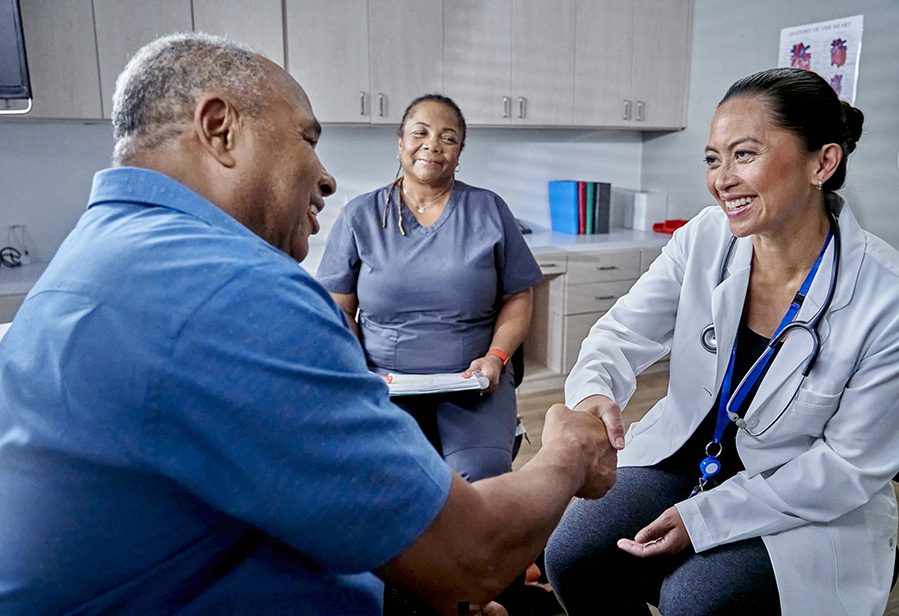The COVID-19 pandemic hit everyone hard. It affected the lives of older adults profoundly, as they were the most likely to become seriously ill if they contracted the virus. COVID-19 restrictions, while focusing on keeping seniors physically safe, also forced them to isolate from family, friends, caregivers, and support networks. Many older adults reported negative effects on their mental health, including depression and anxiety.

As the world is slowly coming back to normal post-COVID-19, many older adults are still living with depression and anxiety. Here are some steps you can take to support your loved ones during this challenging time.
What is the Impact of COVID-19 on Mental Health of Seniors?
Twenty-four percent of adults over the age of 65 reported anxiety or depression in August of 2020, more than double the percentage (11%) in 2018. Although fewer older adults reported negative mental health effects from the pandemic than younger populations, the pandemic nonetheless took its toll. While one August 2020 study of seniors with pre-existing major depressive disorder found the circumstances did not make depression worse, respondents worried their mental health would suffer and said their quality of life was lower.
What Are the Reasons for this Increase in Anxiety and Depression?
Seniors experienced loneliness, as they were isolated from others. Coupled with that isolation came worries about getting the virus and the care they might need if they became ill. As the pandemic went on much longer than expected, these feelings became more profound. Although many older adults still expressed outward resilience, others showed new signs of depression like low energy, decreased appetite, lack of motivation, and feelings of sadness. As one-third of nursing homes were directly affected by COVID-19, many seniors had lost loved ones or knew someone in hospital.
10 Steps to Support Seniors Experiencing Depression
Loved ones of older adults with depression can take steps to support them, especially as public health restrictions begin to lift. Here are some things that you can do.
1) Recognize that Older Adults May Not Reveal Feelings of Depression
Most seniors have lived through loss, economic depressions, and perhaps even war. As a result, they may not openly express feelings of depression. Ask instead about eating, sleeping, and moods to uncover changes that may signal depression.
2) Develop a Support System
Get others involved in the senior’s life. Recruit family members and friends to coordinate check-ins. Focus on the people the older adult enjoys spending time with, as this may better support their mental health.
3) Avoid False Reassurance
If a senior expresses negative feelings, avoid the impulse to say everything is fine. Instead, acknowledge the hardship and offer companionship and support. Not acknowledging the autonomy and independence of an older adult can be a form of ageism, which can create higher levels of stress.
4) Help Prepare Meals
Meal preparation, in-person if possible, is one way to provide companionship. It also promotes healthy eating, which is important when older adults experience low appetite. Making meals and delivering them also gives the senior one less thing to think about, and may help encourage eating and prevent weight loss.
5) Participate in Activities They Enjoy
Physical activities, like walks and bike rides, can improve mood. Ask the senior what they like to do and arrange an outing. You can also invite them to take part in your regular routine, like picking up the kids from school once or twice a week.
6) Call or Send Care Packages
When it is not possible to visit, regular phone calls can fill the gap. Send care packages in the mail with cards, family photos, and letters filled with family news.
7) Offer Help With Technology
Virtual check-ins with family, friends, and medical providers can help others to recognize symptoms of depression. It is also an important way to combat feelings of isolation. Many older adults don’t like technology, but may use online tools more with some technical support and guidance.
8) Provide Assistance With Medical Appointments
Seeing a doctor to assess overall health is critical for older adults experiencing depression. Make it easier on them to schedule and attend medical visits. Book the appointment, drive them to the clinic, or help them log on for an online consultation.
9) Respect Individual Preferences
Your loved one may not want to change their routine or participate in new activities. Try to respect their wishes while still offering support. A psychologist who specializes in older adults can help.
10) Encourage Them to Seek Help
There are a number of medical supports for seniors experiencing depression, but your loved one may not ask for help. Work with a medical provider to offer that assistance or encourage the senior to ask about it during their next doctor’s visit.
What Questions Should I Ask a Provider?
You may be able to ask a medical professional about the best way to support your loved one. Every older adult with depression is living in unique circumstances with specific physical and mental health concerns. Questions you might ask include:
- How can I help my loved one with depression?
- How can I talk to my loved one about depression?
- Are there any physical activities that might help improve mood?
- What physical risks or limitations should I be aware of?
- Can you recommend a mental health provider, group, or service?
In many cases, starting the conversation about mental health can make a big difference in a senior’s life.
Why Choose a Provider at Intermountain Health?
Intermountain Health is dedicated to preventive and specialized care for seniors. Our network of myGeneration Clinics are exclusively for people with Medicare Advantage. We offer superior care, including longer visits so older adults have more time to discuss concerns with their doctor. To learn more about how Intermountain Health can support the mental health of seniors, or to book an appointment, find a clinic near you today.
*This article is for informational purposes only and is not intended to be a substitute for medical advice or diagnosis from a physician or qualified healthcare professional.





